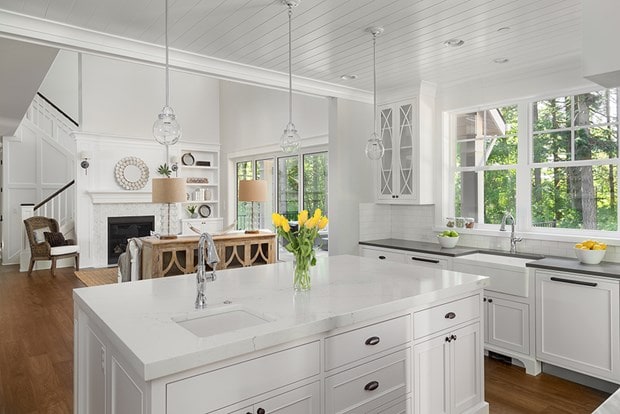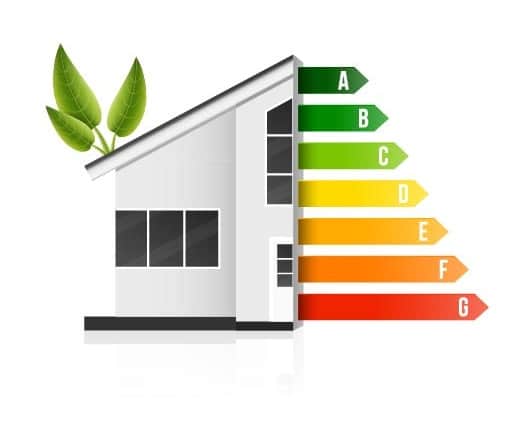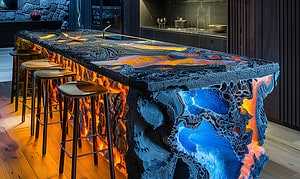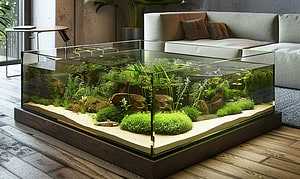Most people fear going green with the thought that eco-friendly means expensive. Again, some people feel that they will not find eco-friendly replacements for all the household products they need. That is not entirely true – there are eco-friendly alternatives for almost every household product you can see in your house. Again, green products cost the same as conventional products (sometimes even less if you have to recycle products at home).
A green kitchen starts when you eat green, but that is the start. To completely turn your kitchen green, you need energy-efficient means of food preparation, eco-friendly cleaning products, and use of equipment made of eco-friendly material, among other practices. Below are a few green tips to change your kitchen.
Durability Matters in a Green Kitchen
Instead of buying utensils that you will end up throwing the next day, choose high quality utensils and kitchen elements. For starters, ditch Teflon as this will only end up in landfills, ditch plastic and wooden spoons and utensils given their relatively shorter lifespan. Instead, focus on stainless steel and cast iron utensils. While stainless steel and cast iron utensils will cost more, they will last for a generation meaning you will not throw out your cookware with leftover food every day.
If you want to experiment cooking, instead of buying gadgets that you will use once, try the kitchen library in your neighborhood. For countertops and cabinets, pick a high quality stone and high quality wood. Instead of granite, marble, and laminate, install a quartz or Corian countertop. The latter will last for generations.
Energy Efficient Cookers
Should you go for gas or electric cookers? Naturally, gas is a product of fossil fuel. Electric on the other side comes from burning coal (most of the electricity produced in the US at least). As such, it is a tough choice picking between gas and electric cookers.
Your only option is to pick energy-efficient cookers. If you decide to use gas, pick a stove with a low BTU output as this means it is more energy-efficient depending on the usage. For an electric cooker, consider a cooker with an induction element as it transfers heat directly to the pan while the cooker top remains cool. Though cookers with induction elements cost relatively higher, they will save a lot of energy. Electric stoves are cleaner than gas, seeing that they do not produce any fumes. If you need a smoker for tailgating, consider energy efficiency.
Dispose of Old Appliances the Right Way
There is an energy-efficient model of your favorite appliances in the stores today. If you are to dispose of your old appliances for the new, check whether your community has a take-back program and give out the old appliances. Again, before getting the latest appliances, check whether an upgrade or repair will make your appliances more energy-efficient. Check for Energy Star Rating on all new appliances.
For all the appliances you buy, consider small units. For instance, a fridge that just keeps enough food is ideal compared to a refrigerator whose compartments will stay empty for so long – most foods, such as fruits, stay for longer outside the fridge.
Buy Local Foods – Eat Green
If you have all the green equipment and utensils and then you do not eat green, why would you even want a green kitchen in the first place? Food miles determine the eco-friendliness of the food you eat. When you buy food closer to your home, you reduce the fuel used to transport food to your kitchen. You can support community agriculture to enhance the production of local foods.
When buying local foods, buy in bulk and cook in bulk – this will save energy (and also save your time). However, plan your meals to ensure you only cook what you can eat before the food goes bad. To do that, carry your packaging to stores so you can buy just enough fresh foods. Again, you need to avoid oversized portions that will only end up in your kitchen dustbin.
If you can reheat foods instead of tossing them into the bin, do so. That also goes for carrier bags, glass jars, packaging, and bottles – reuse them to save the environment.
A lot of organic waste ends up in landfills. Instead of putting the trash in your bin, compost it and give it to local farmers.

Choose Green Cleaning Agents
A lot of chemicals go into the cleaning agents we use at home. Luckily, there are hundreds of eco-friendly cleaning liquids and detergents. The right cleaning agents need to be non-toxic, plant-based, and biodegradable. If you cannot see green cleaning products in your local stores, create your cleaning products using baking soda and vinegar.
Reuse, Recycle
Instead of buying all new elements and fixtures in your kitchen, consider giving the old element an upgrade instead of buying new ones. You can, for instance, repair your kitchen cabinets using high quality wood and refacing your kitchen countertops.
Making the old kitchen work is a great idea, but that will not always be the case – at one time, you will need to replace a few elements of your kitchen. If you go shopping for new kitchen elements, consider antiques and salvage. You can pick fittings, paneling, cabinets, and floors that have been used before and have stood the test of time. If you are throwing away your old kitchen cabinets or countertops, give them out on Craiglist or any other sites that take old items.
If you do not want reclaimed kitchen materials, look for green materials such as green countertops.
Conclusion
For every little item you use in the kitchen, including paper towels, coffee cups, lighting, sponges, food huggers, and many more, there is an eco-friendly alternatively. Before you buy these green products, research on their impact on the environment to ensure they are safe. In the long run, using green kitchen products will save you money – you buy long-lasting products, buy and cook in bulk, use energy-efficient cookers, and recycle products. These eco-friendly practices not only protect the environment but are also easy on your pocket.
















